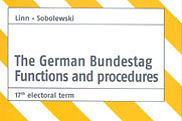Navigationpath: Homepage > German Bundestag > Committees
Function and responsibilities

A view of one of the committee rooms © German Bundestag/ Unger
Appointment and composition of the permanent committees
Parallel organisation
The permanent committees are newly appointed and differently composed each electoral term. The Bundestag does not have a completely free hand when setting up these bodies, since some committees are provided for by the Basic Law and others have to be set up as a result of certain statutory formulations. These committees include, for example, the Petitions Committee and the Defence Committee.
On the whole, however, the organisation of the permanent committees established by the German Bundestag parallels the structure of the Federal Government: in general, there is a dedicated permanent committee for each of the ministries.
In addition to this, Parliament can give prominence to particular areas of policy by setting up additional committees. For instance, in the 17th electoral term the work of the Federal Ministry of the Interior is scrutinised not just by the Committee on Internal Affairs, but also by the Sports Committee.
Varying number of committees
The number of permanent committees varies from one electoral term to the next. For example, the first Bundestag elected in 1949 had a total of 40 permanent committees, but the sixth only 17.
In the current 17th electoral term, the Bundestag has established 22 permanent committees.
In addition to this, some of the permanent committees also set up subcommittees, which are intended to intensively examine specific topics.
Composition proportional to relative strengths of the parties
Each committee consists of a chair, a deputy chair and a certain number of members, each of whom has a substitute to deputise for them in their absence. The committees differ in size, and the number of members they have depends on the amount of work to be expected. In the 17th electoral term, the committees consist of between 13 and 41 members.
Seats are distributed according to the relative strengths of the parties in Parliament: each parliamentary group has a right to a certain number of places on each of the committees proportional to its share of seats in the Bundestag. The leaderships of the parliamentary groups decide which Members are to sit on which committees, seeking to meet Members’ requests as far as possible. Ideally, each Member should only be a full member of one committee.
Agreement or mathematical formula
The committee chairs occupy significant positions: they prepare, convene and conduct the committees’ meetings.
The parliamentary groups negotiate among themselves over the appointment of the committee chairs and deputy chairs. If no agreement is reached, what is known as the Sainte-Laguë/Schepers method is applied.
A mathematical formula is used to convert the relative strengths of the parliamentary groups into a ranking, which determines the order in which they are able to state their wishes concerning the composition and officeholders of the committees.
Parliamentary groups and their spokespersons on the committees
The spokespersons of the parliamentary groups also hold key positions on the committees. The parliamentary groups appoint "spokespersons" on all the committees who act as the main points of contact for the parliamentary group leaderships.
On the one hand, the spokespersons play a crucial role in determining the approach their parliamentary groups adopt in the individual committees. On the other, they have a degree of authority that enables them to mediate when conflicts arise during negotiations.
Committee members’ voting rights
Each full member of a committee has one vote when decisions are taken. Substitutes may participate in all committee meetings, but are only entitled to vote when deputising for a full member from their parliamentary group who is not present.
Members who do not belong to either a parliamentary group or a grouping are consulted by the President of the German Bundestag, who then allocates them a seat on a committee. These Members are entitled to speak and table motions in that committee, but have no voting rights.
Permanent committees: function, responsibilities, powers
Preparing decisions
The Rules of Procedure of the German Bundestag describe the permanent committees as "bodies responsible for preparing the decisions of the Bundestag". Even this brief definition gives some sense of the enormous significance the committees have for the work of Parliament.
The committees debate and discuss draft bills relating to their policy areas and usually revise them to such an extent that, at the end of the process, a bill can be passed in its committee version. However, the decision recommended by a committee may also be the rejection of the bill.
The recommendation for a decision that has been drawn up is then voted on in the plenary of the Bundestag - usually after another debate. The members of the committees therefore do a considerable amount of the technical policy work involved in the process of adopting legislation.
Committees’ rights to take up issues and hold hearings
As a rule, the committees are assigned their work by the plenary of the Bundestag: after their first reading in the plenary, draft bills are referred to the relevant specialist committee for deliberation.
However, the committees can also act on their own initiative. Legitimised by their right to take up issues on their own authority, they may deliberate on issues that fall within their terms of reference without referral from the plenary and obtain information about legislative projects from the ministries.
The committees are also able to hold public hearings of lobbying organisations, interest group representatives and expert witnesses at any time. These hearings help committee members to inform themselves more fully about the topics on which they deliberate.
Subcommittees
Each committee can form subcommittees to prepare and support its work. These subcommittees are often set up to deliberate on particular bills or problems. However, they may also be established to deal with certain specific aspects of policy throughout an electoral term.
For instance, in the 17th electoral term the Budget Committee has set up the Subcommittee on European Union Issues.
Further Information
Information Material
-
The German Bundestag - functions and procedures
-
Facts: The Bundestag at a glance



